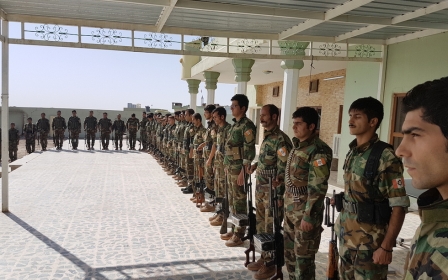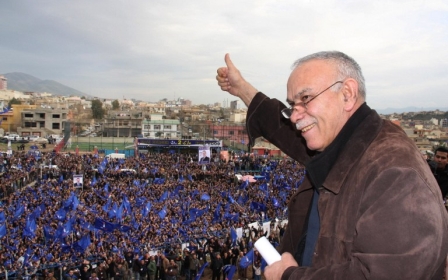Iraqi Kurdish leader Jalal Talabani dies, aged 83

Jalal Talabani, leader of the Patriotic Union of Kurdistan (PUK) and former president of Iraq, died on Tuesday aged 83, after slipping into a coma in Germany.
After President Massoud Barzani, who is 13 years his junior, Talabani - known to Kurds as "Mam" or "Uncle" Jalal - was the most senior political figure in Iraqi Kurdistan and spent more than 50 years as a campaigner and fighter for Kurdish rights.
In the divisive world of Iraqi politics, Talabani was seen by many as a unifying figure.
"Tribute to the leader and President Talabani, the only president whose death makes the Arabs, Kurds and all other ethnic groups sad," said Zana Said, a Kurdish MP, on hearing of his death.
"We pray to God that his death will be a factor in returning to (good) relations between the Iraqi brothers."
Born in 1933 in the village of Kelkan in Iraq, 10 years after the Treaty of Lausanne saw the hope of an independent Kurdish state dashed by the allied powers, Talabani became involved in the struggle to achieve autonomy for Kurds in the country, which was then led by Mullah Mustafa Barzani (father of the current president) and his Kurdistan Democratic Party (KDP).
Although the 1958 coup d'etat by Abd al-Karim Qasim came with a promise for greater rights for Kurds within Iraq, tensions eventually boiled over and Kurds revolted against the Arab nationalist government in Baghdad in 1961. Talabani took charge of forces in the cities of Kirkuk and Sulemaniyah and fighting with Baghdad lasted until 1970, with Israel and Iran backing Kurds as an attempt to weaken Iraq.
One result was the the Iraqi-Kurdish Autonomy Agreement which saw the first attempt at recognition of Kurdish national rights within Iraq. Talks with the then Baathist government collapsed, however, and in 1974 another war broke out with Baghdad.
In 1975, after negotiations for concessions with Baghdad, Iran abruptly withdrew its support for the Iraqi Kurds, leading to a crushing defeat and the political discrediting of Barzani and the KDP.
As a result, Talabani and his allies formed the PUK, which coalesced a range of left-wing Kurdish parties opposed to the KDP's politics, which they saw as too conservative and tribalistic. Among the co-founders was Nawshirwan Mustafa, who would later break away to form to the Gorran Movement in opposition to what he percieved as Talabani's own tribalist tendencies.
Opposition to tribalism
The PUK's support based lay primarily in the southern Sulemaniyah province of Iraqi Kurdistan and attracted more intellectual, leftist and liberal supporters. The party also maintained more cordial relations with the Kurdistan Workers Party (PKK) in Turkey, who shared the PUK's hostility to the KDP's tribalism.
Throughout the 80s and 90s the Talabani-led PUK and its Peshmerga forces fought with the Iraqi government under Saddam Hussein. In 1991, along with the KDP, they helped secure a no-fly zone over Iraqi Kurdistan from the US and set about creating the de facto autonomous region that would later evolve into the Kurdistan Regional Government (KRG).
In 1994, clashes broke out between the PUK and KDP leading to a civil war which saw thousands killed and drew in neighbouring powers Iran and Turkey, the latter allied to the KDP in an attempt to crush the PUK's allies, the PKK.
After foreign intervention, calm was eventually restored, and after the 2003 invasion of Iraq - which was praised by Talabani as a "courageous decision" by then US President George Bush - Kurdish autonomy was finally officially embedded in the Iraqi constitution.
In 2005, Talabani was elected as the first non-Arab president of Iraq, as part of the ethno-religious framework which saw the presidency reserved for a Kurd.
In the following years, Iraqi Kurdistan was built into a relatively stable emerging economic power, while the rest of Iraq descended into sectarian bloodshed.
As part of a coalition with the KDP, the PUK swept the Kurdish parliamentary election in 2005 and the party held its political grip on Sulemaniyah, which to this day is littered with billboards and flags depicting Talabani.
However, the PUK's position was later challenged by Gorran, who in the 2013 elections beat the PUK to become the second largest party in the Kurdish parliament.
Gorran campaigned on an anti-corruption platform and argued that Kurdish politics had become nepotistic and dominated by the Barzani and Talabani clans, both of whom had numerous relatives in senior political positions. Talabani's son, Qubad, is currently the deputy prime minister of the KRG.
In 2012, Talabani suffered a stroke and later had to regularly travel to Germany to receive treatment. In 2014, his tenure as president ended and he was replaced by Fuad Masum, another PUK member.
His death comes a week after Iraqi Kurds voted for their region to become independent in a referendum that was treated with some scepticism by the PUK.
Last week, Barzani told a rally in Sulemaniyah that Kurdistan's quest for independence would have been easier had Talabani been in better health.
"My dear brother President Mam Jalal, I will never forget your brotherhood," said Barzani.
Stay informed with MEE's newsletters
Sign up to get the latest alerts, insights and analysis, starting with Turkey Unpacked
Middle East Eye delivers independent and unrivalled coverage and analysis of the Middle East, North Africa and beyond. To learn more about republishing this content and the associated fees, please fill out this form. More about MEE can be found here.




